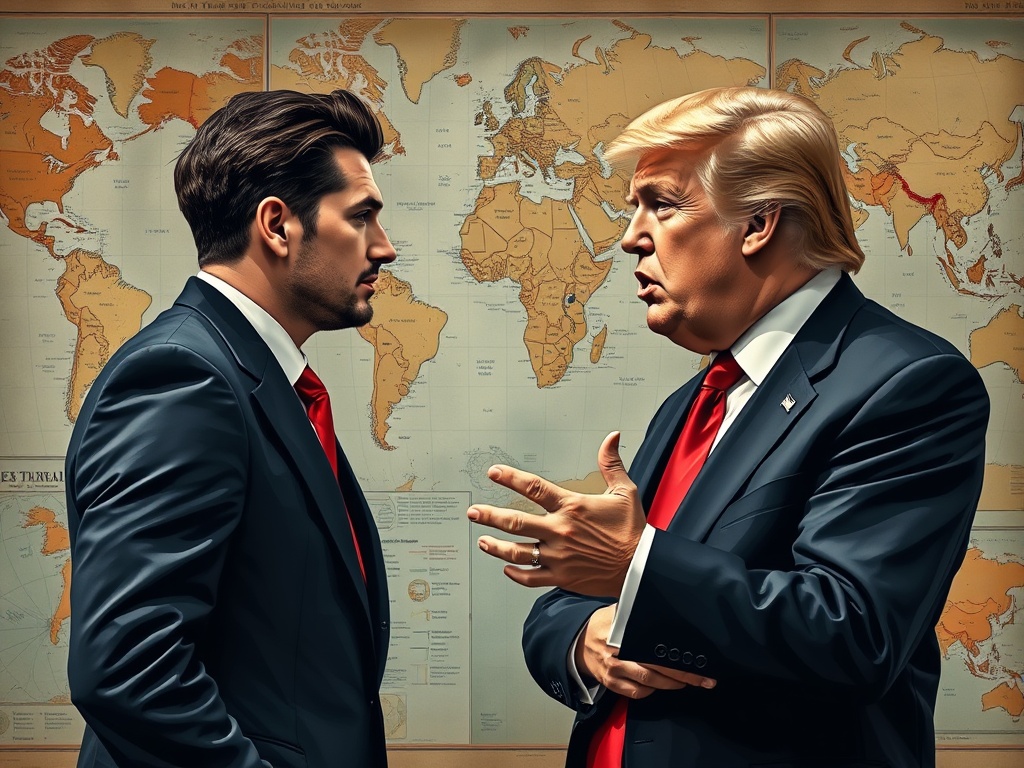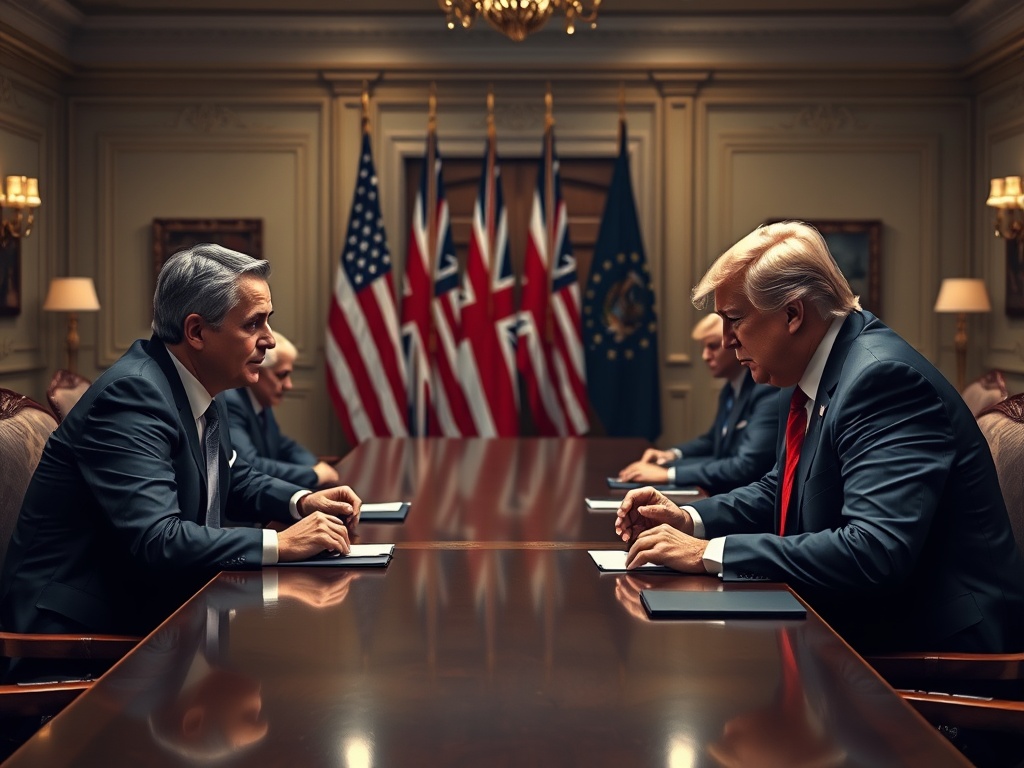Keir Starmer is set to embark on a significant trip to Washington this week, marking his first official engagement with President Donald Trump since the latter took office. This meeting comes at a time of heightened tensions, particularly regarding Trump’s controversial rhetoric surrounding Russia’s invasion of Ukraine. The Prime Minister has made it clear that he intends to reiterate his “ironclad support” for Ukraine, as well as to advocate for a resolution that would bring about lasting peace and effectively end Russia’s unlawful military actions.
In recent weeks, Trump and his administration have intensified their criticisms of Ukraine, with the President characterizing Ukrainian leader Volodymyr Zelensky as a “dictator.” This escalation in rhetoric precedes the upcoming three-year anniversary of the Russian invasion of Ukraine, which is set to occur on Monday. Against this backdrop of geopolitical uncertainty, Starmer’s visit to Washington follows closely on the heels of French President Emmanuel Macron, who will also engage in similar discussions with Trump.
Here are the key objectives Starmer hopes to accomplish during his talks with Trump:
Firm Guarantees for Ukraine’s Security

The security situation in Ukraine remains a paramount concern, especially given President Trump’s recent overtures towards Russia and the increasingly fraught relations between Washington and Kyiv. Starmer has expressed a desire to secure a steadfast commitment from the United States regarding Ukraine’s sovereignty, particularly in light of fears that any peace agreement might necessitate significant territorial concessions.
During a phone call with Zelensky on Saturday, Starmer emphasized that “safeguarding Ukraine’s sovereignty is essential to deter future aggression from Russia.” Currently, Moscow occupies approximately 20% of Ukrainian territory, and Zelensky has consistently called for the liberation of these regions. However, the US administration has seemingly downplayed this demand. US Defense Secretary Pete Hegseth recently described the expectation of Ukraine reverting to its pre-2014 borders as “unrealistic.”
Hegseth stated at a defense summit in Brussels earlier this month, “We want, like you, a sovereign and prosperous Ukraine. But we must recognize that returning to Ukraine’s pre-2014 borders is an unrealistic objective. Pursuing this illusory goal will only prolong the war and exacerbate suffering.” He also reiterated Trump’s long-standing opposition to Ukraine’s membership in NATO, a position Zelensky has ardently advocated.
Another critical aspect of the discussions will focus on the role of European and US troops in maintaining peace in Ukraine should hostilities cease. Starmer is expected to propose the creation of a European “reassurance force,” which would involve deploying NATO troops to deter further Russian hostility and provide a stabilizing presence in the region. However, the US administration has made it clear that it will not send troops to facilitate the peace process, with Hegseth insisting that “any security guarantee must be supported by capable European and non-European troops.”
Zelensky’s Role in Negotiations
Following a conversation between Zelensky and Starmer on Saturday, a spokesperson for No 10 reiterated that the Prime Minister “repeated that Ukraine must be at the heart of any negotiations to end the war,” a point he will emphasize during his meeting with Trump. Relations between the US and Ukraine have grown tense after the US held peace talks with Russian officials earlier this month, excluding representatives from Zelensky’s administration. Another round of talks is scheduled for Tuesday, again without Ukraine’s involvement.
The UK government has refrained from criticizing the US for sidelining Ukraine; however, Education Secretary Bridget Phillipson stated on Sky News on Sunday that the government welcomes “the approach President Trump is taking in seeking to get parties to the negotiating table.” She stressed that Ukraine must be included in future negotiations.
Macron recently convened crisis talks in Paris amid concerns that Trump, having spoken with Russian President Vladimir Putin just days prior, was attempting to seize control of the peace process. It is widely believed that Zelensky would be reluctant to accept any peace deal not negotiated with his involvement, and he has openly criticized the US for attempting to dominate the process. Following his call with Starmer, he noted on social media, “Europe must be at the negotiating table to end the war and ensure strong security guarantees. Ukraine’s security is inseparable from Europe’s security.”
Trump, on the other hand, has defended his decision to exclude Ukraine, asserting that Russia “has the cards” in the negotiations. Speaking to Fox Radio on Saturday, he remarked, “I’ve been watching for years, and I’ve seen him negotiate with no cards. [Zelensky] has no cards. And you get sick of it. You just get sick of it. I’ve had it. He’s been at meetings for three years, and nothing got done. So, I don’t think it’s very important to be at meetings, to be honest with you. He makes it very hard to make deals.” He further criticized Zelensky’s performance, claiming he has done a “terrible job” and warned that the US “better move fast, or he is not going to have a country left.”
Consensus on Defence Spending
Trump has been vocally critical of NATO throughout his presidential campaign, frequently asserting that European member states are not contributing adequately to defense expenditures. He has called for European nations to increase their defense spending to 5% of GDP, a figure significantly higher than any nation, including the US, currently allocates.
In early January, Trump stated from his Mar-a-Lago estate in Florida, “Europe is in for a tiny fraction of the money that we’re in. We have a thing called the ocean in between us, right? Why are we in for billions and billions of dollars more money than Europe?” He reiterated this sentiment on Friday in an interview with Fox Radio, criticizing the UK and France for “doing nothing” to resolve the conflict and claiming that Russia had only engaged in negotiations “because of me.”
NATO members are required to spend a minimum of 2% of GDP on defense annually by 2024, but only 23 out of 32 members are projected to meet this criterion. Poland is currently the highest spender at 4.1%, followed by the US and Estonia at 3.4%. The UK currently allocates 2.3% of its GDP to defense, but Labour has committed to increasing this to 2.5% when economic conditions permit. The Conservatives, Liberal Democrats, and Reform UK all support meeting this target by 2030.
Starmer may take the opportunity during his meeting with Trump to outline a specific timeline for the UK to reach this goal to gain favor with the US. However, this could place him in a challenging position domestically, as fulfilling the 2.5% commitment could impose an additional burden of approximately £6 billion per year on the UK budget. Reports suggest that Starmer has overridden Chancellor Rachel Reeves regarding this target, with the Chancellor indicating that “difficult decisions” will be necessary to meet this objective.
Addressing US Tariffs
Trump has consistently threatened to impose tariffs on the UK and other trading partners, raising concerns globally. Earlier this month, he signed an executive order authorizing reciprocal tariffs aimed at “restoring fairness” to international trade. In relation to Europe, he has specifically targeted the introduction of value-added tax (VAT) on goods, asserting that the US “is going to call it a tariff.”
“Whatever they charge us, we will charge them,” he stated. Trump added, “I’ve decided for purposes of fairness that I will impose a reciprocal tariff. It’s fair to all. No other country can complain.” It remains uncertain whether the UK will be specifically targeted by these tariffs, as the US plans to address each country individually. Industry analysts warn that if Trump were to implement a reciprocal tariff on VAT for the UK, exporters could face an additional 21% in charges when factoring in other duties.
Additionally, Trump has ordered a 25% import tax on all steel and aluminum entering the US, which could have significant implications for UK industries. No direct tariffs have been imposed on the UK as of yet, and discussing strategies to avert such measures will be a high priority for Starmer during his discussions with Trump. The two leaders are also likely to explore broader economic ties between the UK and the US, amidst calls to revitalize talks regarding a free trade agreement. The UK previously secured several deals with the prior US administration covering green energy, steel tariffs, and visa waiver programs, which could serve as a foundation for future negotiations.




